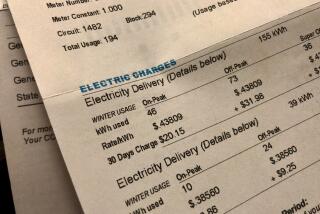Cost Isn’t Only Factor in Deregulating Electricity
- Share via
Deregulation of the electricity supply system comes to California next year. Because of the complexity of the electricity network, there are greater risks in deregulating this industry than others we have experienced. The major regional blackout we had last summer was a portent of what could happen when we trade marginally lower prices for supply instability. This is the real issue.
The supply system that has evolved in the U.S. has maximized reliability at some added cost. This has been viewed as a prudent investment. Yet, in our rush to deregulate electricity we might instead have higher costs in the future. The cost of blackouts could overwhelm any gains we might accrue from lower electricity prices.
Complete deregulation of the electricity supply will favor the lowest price source without regard to longer-term reliability. What happens, for example, if natural gas is the near-term cheapest fuel for power generation and drives the owners of other facilities to abandon their investments? Today, natural gas is the fuel of choice for new power facilities. Yet, the price might rise sharply or supplies could be curtailed. This has happened in the Midwest where especially cold winters have resulted in gas suppliers cutting off power plants and industrial users to supply residential customers. This scenario becomes more likely as we invest more in natural gas-fired generating capacity. Without some consideration to supply reliability we can have brownouts or blackouts with economic and health and safety losses.
Also under many potential deregulation scenarios we could lose the tens of billions of dollars invested in nuclear power plants. Nuclear power is now a reliable source of electricity in the U.S. and supplies about 20% of our power. Although operating costs for nuclear plants rival those of its biggest competitor, coal, many companies have outstanding debt on the construction of their plants that must be paid off. A company cannot afford to maintain a plant that is running below capacity because a lower-cost supplier is available for a short time. The loss of the investment in the nuclear plants would be devastating to the stockholders, who are typically private and pension fund investors saving for retirement. Closures will have a major effect on the local, particularly county, economies that rely on the tax base of an operating nuclear power plant. Nuclear plants are a stabilizing influence on electricity supply, yet they may not always meet the lowest cost criteria.
We have seen problems during the deregulation of the airline, telephone and cable TV industries that caused higher rather than lower prices, wide variations in quality and bankruptcies that disrupted service. We cannot afford those kinds of disruptions in electricity supply. Deregulation is inevitable, but it must be done with great care to preserve the integrity of the system and to prevent large economic losses.
More to Read
Inside the business of entertainment
The Wide Shot brings you news, analysis and insights on everything from streaming wars to production — and what it all means for the future.
You may occasionally receive promotional content from the Los Angeles Times.










